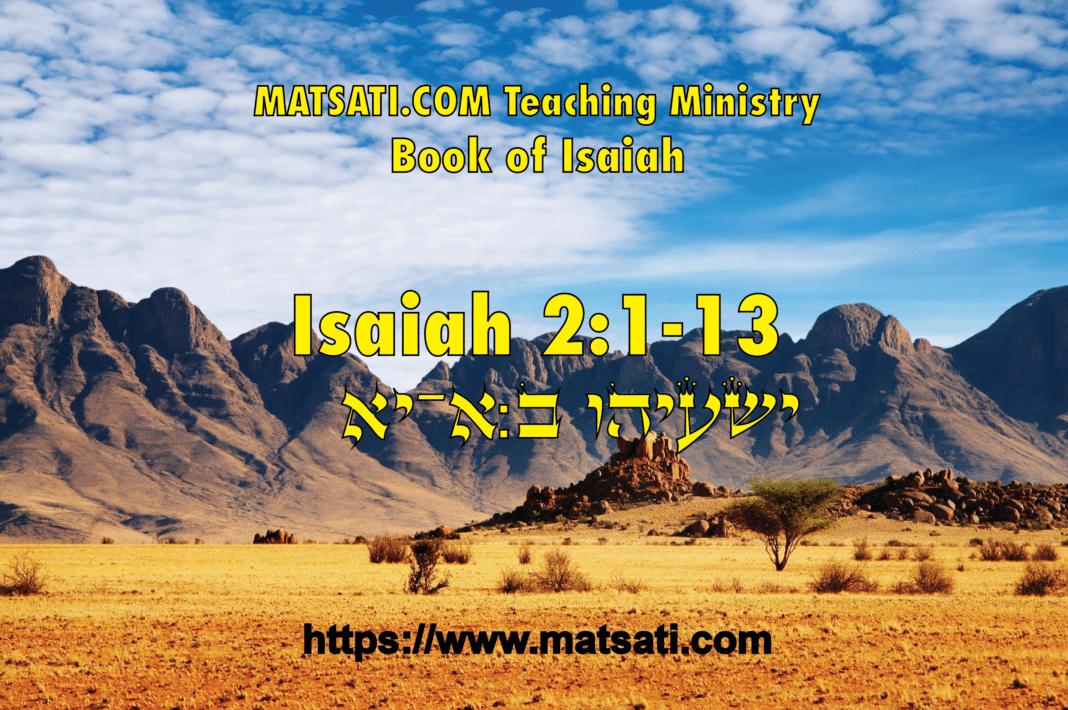Table of Contents
Introduction to Isaiah 2:1-11
ספר ישעיה פרק ב
א הַדָּבָר֙ אֲשֶׁ֣ר חָזָ֔ה יְשַֽׁעְיָ֖הוּ בֶּן־אָמ֑וֹץ עַל־יְהוּדָ֖ה וִירוּשָׁלִָֽם׃
Isaiah 2:1 states, “The word that Isaiah the son of Amoz saw (הַדָּבָר֙ אֲשֶׁ֣ר חָזָ֔ה יְשַֽׁעְיָ֖הוּ בֶּן־אָמ֑וֹץ) concerning Judah and Jerusalem. (עַל־יְהוּדָ֖ה וִירוּשָׁלִָֽם).” It is interesting how Isaiah seems to repeat what we read according to Isaiah 1:1 The vision of Isaiah the son of Amoz, which he saw concerning Judah and Jerusalem in the days of Uzziah, Jotham, Ahaz, and Hezekiah, kings of Judah. (KJV, א הַדָּבָר֙ אֲשֶׁ֣ר חָזָ֔ה יְשַֽׁעְיָ֖הוּ בֶּן־אָמ֑וֹץ עַל־יְהוּדָ֖ה וִירוּשָׁלִָֽם׃) Isaiah must be clarifying that what he is seeing or stating that what he is continuing to see still pertains to Judah and Jerusalem. It is interesting how Isaiah formulates his words saying, הַדָּבָר֙ אֲשֶׁ֣ר חָזָ֔ה יְשַֽׁעְיָ֖הוּ בֶּן־אָמ֑וֹץ “The word that Isaiah the son of Amoz saw.” This is outside of the ordinary way of stating the Lord is showing a vision. The ordinary way a prophetic message is related to us according to the Tanakh is the phrase similar to what Jeremiah said in Jeremiah 14:1 אֲשֶׁ֨ר הָיָ֤ה דְבַר־יְהוָה֙ אֶֽל־ “the word of the Lord came to …” Other examples may be found in Ezekiel 13:1, Hosea 1:1, Joel 1:1, Jon. 1:1, Miccah 1:1, Zephaniah 1:1, etc. The prophet Amos speaks in a similar way to Isaiah saying, דִּבְרֵ֣י עָמ֔וֹס אֲשֶׁר־הָיָ֥ה בַנֹּקְדִ֖ים מִתְּק֑וֹעַ אֲשֶׁר֩ חָזָ֨ה עַל־יִשְׂרָאֵ֜ל בִּימֵ֣י׀ עֻזִּיָּ֣ה מֶֽלֶךְ־יְהוּדָ֗ה וּבִימֵ֞י יָרָבְעָ֤ם בֶּן־יוֹאָשׁ֙ מֶ֣לֶךְ יִשְׂרָאֵ֔ל שְׁנָתַ֖יִם לִפְנֵ֥י הָרָֽעַשׁ׃ 1:1 The words of Amos, who was among the herdmen of Tekoa, which he saw concerning Israel in the days of Uzziah king of Judah, and in the days of Jeroboam the son of Joash king of Israel, two years before the earthquake. (KJV) Here Isaiah using the word חָזָ֔ה khazah he is announcing his vision to Judah and Jerusalem saying he has perceived a vision from God concerning them.
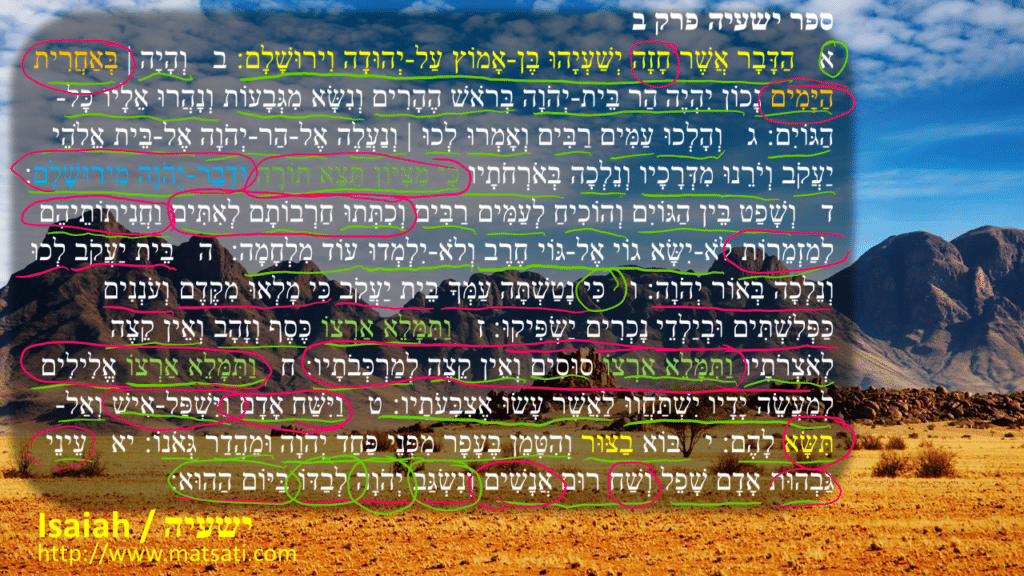
ספר ישעיה פרק ב
ב וְהָיָ֣ה׀ בְּאַחֲרִ֣ית הַיָּמִ֗ים נָכ֨וֹן יִֽהְיֶ֜ה הַ֤ר בֵּית־יְהוָה֙ בְּרֹ֣אשׁ הֶהָרִ֔ים וְנִשָּׂ֖א מִגְּבָע֑וֹת וְנָהֲר֥וּ אֵלָ֖יו כָּל־הַגּוֹיִֽם׃ ג וְֽהָלְכ֞וּ עַמִּ֣ים רַבִּ֗ים וְאָמְרוּ֙ לְכ֣וּ׀ וְנַעֲלֶ֣ה אֶל־הַר־יְהוָ֗ה אֶל־בֵּית֙ אֱלֹהֵ֣י יַעֲקֹ֔ב וְיֹרֵ֙נוּ֙ מִדְּרָכָ֔יו וְנֵלְכָ֖ה בְּאֹרְחֹתָ֑יו כִּ֤י מִצִּיּוֹן֙ תֵּצֵ֣א תוֹרָ֔ה וּדְבַר־יְהוָ֖ה מִירוּשָׁלִָֽם׃ ד וְשָׁפַט֙ בֵּ֣ין הַגּוֹיִ֔ם וְהוֹכִ֖יחַ לְעַמִּ֣ים רַבִּ֑ים וְכִתְּת֨וּ חַרְבוֹתָ֜ם לְאִתִּ֗ים וַחֲנִיתֽוֹתֵיהֶם֙ לְמַזְמֵר֔וֹת לֹא־יִשָּׂ֨א ג֤וֹי אֶל־גּוֹי֙ חֶ֔רֶב וְלֹא־יִלְמְד֥וּ ע֖וֹד מִלְחָמָֽה׃
Isaiah 2:2 goes on saying, “And it shall come to pass (וְהָיָ֣ה׀) in the last days, (בְּאַחֲרִ֣ית הַיָּמִ֗ים) That the mountain of the Lord’s house shall be established (נָכ֨וֹן יִֽהְיֶ֜ה הַ֤ר בֵּית־יְהוָה֙) in the top of the mountains, (בְּרֹ֣אשׁ הֶהָרִ֔ים) And shall be exalted above the hills; (וְנִשָּׂ֖א מִגְּבָע֑וֹת) And all nations shall flow unto it. (וְנָהֲר֥וּ אֵלָ֖יו כָּל־הַגּוֹיִֽם)“ Note how Isaiah here speaks of the future restoration of Israel. The words בְּאַחֲרִ֣ית הַיָּמִ֗ים “in the last days” reminds us of having eschatological significance. We note how the text states that the בֵּית־יְהוָה֙ “house of HaShem” will be established upon the mountain and the nation’s will flow into it. This demonstrates how Israel was originally intended to be a light to the nations as being the place men from every tribe and nation would come to seek the Lord God Almighty. This phrase בְּאַחֲרִ֣ית הַיָּמִ֗ים occurs frequently in the scripture, performing a search leads to the following verses. (Bereshit / Genesis 49:1, Bamidbar / Numbers 24:14, Devarim / Deuteronomy 4:30, 31:29, Isaiah 2:2, Jeremiah 23:20, 30:24, 48:37, 49:39, Ezekiel 38:16, Hosea 3:5,Micah 4:1, Daniel 10:14) The Torah usage of בְּאַחֲרִ֣ית הַיָּמִ֗ים speaks to the future events that will take place to Israel. Bereshit / Genesis and Bamidbar / Numbers this phrase is used to prepare the people to hear the prophetic word of God about what is going to take place very soon. The message is of the peoples eventual enslavement and falling away. It is important to recognize in Devarim / Deuteronomy the faithfulness of God to draw the people back to faith and faithfulness to the Lord and His ways (instruction / Torah, 4:30). Devarim / Deuteronomy 31:29 describes what we see taking place in Isaiah 1. Jeremiah usage of בְּאַחֲרִ֣ית הַיָּמִ֗ים speaks to the last days they (the people) will consider the words of God concerning what has happened. Ezekiel speaks to the nation’s knowing God, Hosea and Micah speak to the return of Israel to faith, and Daniel to the future events that will take place. Of particular interest is the similarity of Isaiah text to Micah 4:1-3.
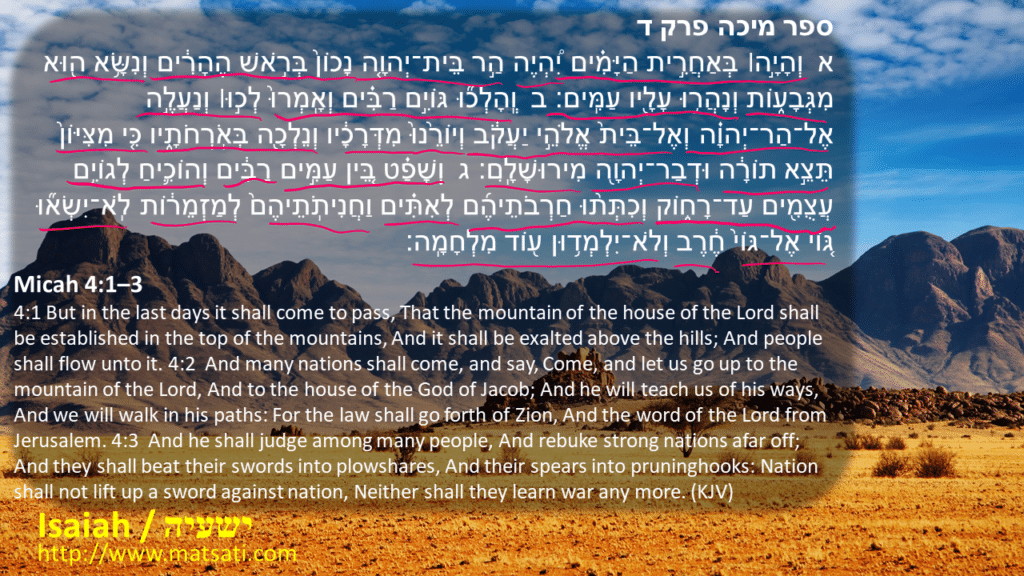
ספר מיכה פרק ד
א וְהָיָ֣ה׀ בְּאַחֲרִ֣ית הַיָּמִ֗ים יִ֠הְיֶה הַ֣ר בֵּית־יְהוָ֤ה נָכוֹן֙ בְּרֹ֣אשׁ הֶהָרִ֔ים וְנִשָּׂ֥א ה֖וּא מִגְּבָע֑וֹת וְנָהֲר֥וּ עָלָ֖יו עַמִּֽים׃ ב וְֽהָלְכ֞וּ גּוֹיִ֣ם רַבִּ֗ים וְאָֽמְרוּ֙ לְכ֣וּ׀ וְנַעֲלֶ֣ה אֶל־הַר־יְהוָ֗ה וְאֶל־בֵּית֙ אֱלֹהֵ֣י יַעֲקֹ֔ב וְיוֹרֵ֙נוּ֙ מִדְּרָכָ֔יו וְנֵלְכָ֖ה בְּאֹֽרְחֹתָ֑יו כִּ֤י מִצִּיּוֹן֙ תֵּצֵ֣א תוֹרָ֔ה וּדְבַר־יְהוָ֖ה מִירוּשָׁלִָֽם׃ ג וְשָׁפַ֗ט בֵּ֚ין עַמִּ֣ים רַבִּ֔ים וְהוֹכִ֛יחַ לְגוֹיִ֥ם עֲצֻמִ֖ים עַד־רָח֑וֹק וְכִתְּת֨וּ חַרְבֹתֵיהֶ֜ם לְאִתִּ֗ים וַחֲנִיתֹֽתֵיהֶם֙ לְמַזְמֵר֔וֹת לֹֽא־יִשְׂא֞וּ גּ֤וֹי אֶל־גּוֹי֙ חֶ֔רֶב וְלֹא־יִלְמְד֥וּן ע֖וֹד מִלְחָמָֽה׃
Micah 4:1–3
4:1 But in the last days it shall come to pass, That the mountain of the house of the Lord shall be established in the top of the mountains, And it shall be exalted above the hills; And people shall flow unto it. 4:2 And many nations shall come, and say, Come, and let us go up to the mountain of the Lord, And to the house of the God of Jacob; And he will teach us of his ways, And we will walk in his paths: For the law shall go forth of Zion, And the word of the Lord from Jerusalem. 4:3 And he shall judge among many people, And rebuke strong nations afar off; And they shall beat their swords into plowshares, And their spears into pruninghooks: Nation shall not lift up a sword against nation, Neither shall they learn war any more. (KJV)
Micah’s description of בְּאַחֲרִ֣ית הַיָּמִ֗ים the last days is very similar to Isaiah as we read on Isaiah saying, 2:3 “And many people shall go and say, (וְֽהָלְכ֞וּ עַמִּ֣ים רַבִּ֗ים וְאָמְרוּ֙) Come ye, and let us go up to the mountain of the Lord, (לְכ֣וּ׀ וְנַעֲלֶ֣ה אֶל־הַר־יְהוָ֗ה) To the house of the God of Jacob; (אֶל־בֵּית֙ אֱלֹהֵ֣י יַעֲקֹ֔ב) And he will teach us of his ways, (וְיֹרֵ֙נוּ֙ מִדְּרָכָ֔יו) And we will walk in his paths: (וְנֵלְכָ֖ה בְּאֹרְחֹתָ֑יו) For out of Zion (כִּ֤י מִצִּיּוֹן֙) shall go forth the law, (תֵּצֵ֣א תוֹרָ֔ה) And the word of the Lord from Jerusalem. (וּדְבַר־יְהוָ֖ה מִירוּשָׁלִָֽם)” and 2:4 “And he shall judge among the nations, (וְשָׁפַט֙ בֵּ֣ין הַגּוֹיִֽם) And shall rebuke many people: (וְהוֹכִ֖יחַ לְעַמִּ֣ים רַבִּ֑ים) And they shall beat their swords into plowshares, (וְכִתְּת֨וּ חַרְבוֹתָ֜ם לְאִתִּ֗ים) And their spears into pruninghooks: (וַחֲנִיתֽוֹתֵיהֶם֙ לְמַזְמֵר֔וֹת) Nation shall not lift up sword against nation, (לֹא־יִשָּׂ֨א ג֤וֹי אֶל־גּוֹי֙ חֶ֔רֶב) Neither shall they learn war any more. (וְלֹא־יִלְמְד֥וּ ע֖וֹד מִלְחָמָֽה׃)“ Due to the similarities between Isaiah and Micah, some commentators call into question the authorship of Isaiah. We note that Micah’s ministry was during Pekah (752-732 BC) and Hosea (732-722 BC) and note the Hebrew prophet Isaiah, his ministry was active during the time period of 740-701 BC, therefore these prophets were contemporary, overlapping with Isaiah. Each may have had some influence upon the other. This should not be a reason to question the authorship of the scripture as some Christian Commentators do. (ie. John N Oswalt) Our faith in the authorship of the scriptures should not be affected by these similarities as the inspiration of Scripture comes from the same source, the Lord God Almighty in heaven. John Oswalt does say “Such a strained position as that the two prophets were inspired independently is unnecessary.” His position ultimately comes to the same conclusion that even if the prophets influenced one another, this doesn’t mean one of them isn’t inspired by God. Something to note about these things, the way the phrase בְּאַחֲרִ֣ית הַיָּמִ֗ים is used varies throughout scripture. The meaning of this phrase can be found in the usages of Bereshit / Genesis 49:1, Bamidbar / Numbers 24:14, Devarim / Deuteronomy 31:29, Jeremiah 23:20, 30:24, where the events referred to are within a certain timeframe and not at the end of time or beyond time. On the other hand, the phrase is also used in a more technical way referring to the consummation of history. (Jeremiah 48:47, 49:39, Ezekiel 38:16, Daniel 10:14, Hosea 3:5) This phrase “And they shall beat their swords into plowshares, (וְכִתְּת֨וּ חַרְבוֹתָ֜ם לְאִתִּ֗ים) And their spears into pruninghooks: (וַחֲנִיתֽוֹתֵיהֶם֙ לְמַזְמֵר֔וֹת) Nation shall not lift up sword against nation, (לֹא־יִשָּׂ֨א ג֤וֹי אֶל־גּוֹי֙ חֶ֔רֶב) Neither shall they learn war any more (וְלֹא־יִלְמְד֥וּ ע֖וֹד מִלְחָמָֽה׃)“ however does suggest these words are referring to the end of days.
It is also important to study the context of the Scriptures to see how a particular phrase is being used. The idea here may be a reference to a more recent event, as the time is drawing near when God will bring His Son Yeshua and the nations will stream to him, and begin to learn the ways of God according to His Torah. The conclusion is these events may not necessarily refer to the end of the age, or the consummation of history. We note how Isaiah states, “And many people shall go and say, (וְֽהָלְכ֞וּ עַמִּ֣ים רַבִּ֗ים וְאָמְרוּ֙) Come ye, and let us go up to the mountain of the Lord, (לְכ֣וּ׀ וְנַעֲלֶ֣ה אֶל־הַר־יְהוָ֗ה) To the house of the God of Jacob; (אֶל־בֵּית֙ אֱלֹהֵ֣י יַעֲקֹ֔ב)” which has its parallel to the ancient religions were the people believed their gods lived on some high place. Note all of the high places in which Israel worshiped, serving false gods. Isaiah speaks of the desire to learn the ways of God, suggesting that one day all the world would recognize, or at least the nations, or some within each, would recognize that the God of Israel is the one True God, and His ways are life, and His Son Yeshua gives life to those who ask! Malachi tends to agree with this, saying there would be a time when the Gentiles would seek the Lord by saying that God’s name will be great among the nations. (Malachi 1:11-14) Note the second half of this verse says, “And he will teach us of his ways, (וְיֹרֵ֙נוּ֙ מִדְּרָכָ֔יו) And we will walk in his paths: (וְנֵלְכָ֖ה בְּאֹרְחֹתָ֑יו) For out of Zion (כִּ֤י מִצִּיּוֹן֙) shall go forth the law, (תֵּצֵ֣א תוֹרָ֔ה) And the word of the Lord from Jerusalem. (וּדְבַר־יְהוָ֖ה מִירוּשָׁלִָֽם)“ This speaks of being taught for the purpose of walking in God’s ways! Learning about God is for the purpose of living our lives for Him, and not for ourselves. This is consistent with one of the major themes in all of Scripture of the imperative to trust in the Lord and not in ourselves! Notice how the Torah is coupled to the word of God going forth and on learning how to walk in God’s ways! This suggests to us that there is only one way, one truth, one life to live for the Lord! This also speaks that there is no way to walk in our own personal righteousness. We must walk in God’s righteousness and truth! These things speak to us that there are not many ways to heaven, there is only one way!
ספר ישעיה פרק ב
ה בֵּ֖ית יַעֲקֹ֑ב לְכ֥וּ וְנֵלְכָ֖ה בְּא֥וֹר יְהוָֽה׃
Isaiah 2:5 states, “O house of Jacob, (בֵּ֖ית יַעֲקֹ֔ב) come ye, And let us walk in the light of the Lord. (לְכ֥וּ וְנֵלְכָ֖ה בְּא֥וֹר יְהוָֽה)” Here we see the idea of the light of God (בְּא֥וֹר יְהוָֽה) as a description of the righteousness of God. This draws in the parallel context to the creation account and the power of God. Note in Bereshit / Genesis 1:3-4, God said יְהִ֣י א֑וֹר let there be light and there was light, yet He had not created the sun, moon, or stars. Where was the source of this light, outside of God’s own righteousness and glory? Isaiah speaks to the people to walk in the light as opposed to walking in the darkness which has its counterpart in the pit, the grave, sin, and death. These words speak to both present and future generations of peoples to desire this way of life, to leave their dark ways and their foolish rebellion and to embrace the way of God and his call on our lives.
ספר ישעיה פרק ב
ו כִּ֣י נָטַ֗שְׁתָּה עַמְּךָ֙ בֵּ֣ית יַעֲקֹ֔ב כִּ֤י מָלְאוּ֙ מִקֶּ֔דֶם וְעֹֽנְנִ֖ים כַּפְּלִשְׁתִּ֑ים וּבְיַלְדֵ֥י נָכְרִ֖ים יַשְׂפִּֽיקוּ׃
Isaiah 2:6 states, “Therefore thou hast forsaken thy people (כִּ֣י נָטַ֗שְׁתָּה עַמְּךָ֙) the house of Jacob, (בֵּ֣ית יַעֲקֹ֔ב) Because they be replenished from the east, (כִּ֤י מָלְאוּ֙ מִקֶּ֔דֶם) And are soothsayers like the Philistines, (וְעֹֽנְנִ֖ים כַּפְּלִשְׁתִּ֑ים) And they please themselves in the children of strangers. (וּבְיַלְדֵ֥י נָכְרִ֖ים יַשְׂפִּֽיקוּ)” The tempo changes here in verse 6. We see this word כִּי a conjunction, which can have the meaning “that, for, because, when, as though, as, because that, but, then, certainly, except, surely, since,” depending on the context. This word functions as a connection of the present text to the previous one. This is why it is so important for the people to learn the way of God and to walk in His ways. This change of tempo is a reminder that one cannot continue to walk in sin. What Isaiah is explaining is how the people are walking in the ways of the nations as opposed to the ways of God. The people are filling their land with the ways of the nations, as opposed to filling the land with the ways of God. Judah and Jerusalem are supposed to be shining forth the glory of God, the light of God’s truth, but now it is shining forth their sin, their unfaithfulness, and the way of the nations. It is interesting to note what both the Septuagint (LXX) and Targum Jonathan states, ו אְרֵי שְבַקתוּן דַחלַת תַקִיפָא דַהְוָה פָרִיק לְכֹון דְבֵית יַעְקֹב אְרֵי אִתמְלִיאַת אֲרַעכֹון טָעְוָן כִיד מִלְקַדמִין וְעָנְנִין כִפלִשתָאֵי וּבנִמֹוסֵי עַמְמַיָא אָזְלִין׃ 2:6 Because ye have forsaken the terrible, the mighty One, who has redeemed you of the house of Jacob, therefore your land is full of idols, as from the beginning; and they have become prognosticators by the clouds, like the Philistines; and they are walking in the laws of the nations. (TgJ) and Καὶ νῦν, ὁ οἶκος Ἰακώβ, δεῦτε πορευθῶμεν τῷ φωτὶ Κυρίου. ἀνῆκεν γὰρ τὸν λαὸν αὐτοῦ τὸν οἶκον τοῦ Ἰσραήλ· ὅτι ἐνεπλήσθη ὡς τὸ ἀπʼ ἀρχῆς ἡ χώρα αὐτῶν κληδονισμῶν, ὡς ἡ τῶν ἀλλοφύλων, καὶ τέκνα πολλὰ ἀλλόφυλα ἐγενήθη αὐτοῖς. “For he forsook his people the house of Jacob; for was filled up as from the beginning their place of ones prognosticating, as that of the Philistines; and the children may Philistine were born to them.” Jonathan makes the parallel to idols, to the Philistines, and the חוק (law) of the nations, and the LXX states κληδονισμῶν, ὡς ἡ τῶν ἀλλοφύλων “prognosticating as that of the Philistines.” Note to prognosticate means to predict something or at least hint at what will happen in the future. The LXX suggests that there is divination going on among the peoples as well which is the reason the Lord has forsook them. So Israel has entirely indulged themselves into the pagan ways of the nations. We note that divination is specifically forbidden amongst God’s people according to the Torah in Vayikra / Leviticus 19:26 and Devarim / Deuteronomy 18:9-14. We note why this was forbidden. One of the major themes throughout the Scriptures is to trust in God and not in the flesh or the strength of the body. (Jeremiah 17:5-10). In the practice of divination, one is seeking to manipulate one’s destiny through another means, as opposed to trusting in God. This is why this is a total affront to the ways of God and to what we are being taught according to the Scriptures. The idea is that one may achieve personal security through the cultic practice of the nations, or through one’s own possessions, such as in one’s wealth. Wealth can be snatched away in a very short period of time. Note what happened to Job, it happened almost instantaneously. Trusting in God however is the way for true security, of life, and liberty! The Scriptures reveal to us how the Lord God Almighty called Israel, and us today to commit our security to trusting in God!
ספר ישעיה פרק ב
ז וַתִּמָּלֵ֤א אַרְצוֹ֙ כֶּ֣סֶף וְזָהָ֔ב וְאֵ֥ין קֵ֖צֶה לְאֹצְרֹתָ֑יו וַתִּמָּלֵ֤א אַרְצוֹ֙ סוּסִ֔ים וְאֵ֥ין קֵ֖צֶה לְמַרְכְּבֹתָֽיו׃ ח וַתִּמָּלֵ֥א אַרְצ֖וֹ אֱלִילִ֑ים לְמַעֲשֵׂ֤ה יָדָיו֙ יִֽשְׁתַּחֲו֔וּ לַאֲשֶׁ֥ר עָשׂ֖וּ אֶצְבְּעֹתָֽיו׃
Isaiah 2:7 states, “Their land also is full of silver and gold, (וַתִּמָּלֵ֤א אַרְצוֹ֙ כֶּ֣סֶף וְזָהָ֔ב) Neither is there any end of their treasures; (וְאֵ֥ין קֵ֖צֶה לְאֹצְרֹתָ֑יו) Their land is also full of horses, (וַתִּמָּלֵ֤א אַרְצוֹ֙ סוּסִ֔ים) Neither is there any end of their chariots: (וְאֵ֥ין קֵ֖צֶה לְמַרְכְּבֹתָֽיו)” We note the prosperity that God has given to Israel, in the wealth of the land itself! But wealth and blessing does not keep one from dabbling in the ways of the nations as Isaiah points out saying in Isaiah 2:8 “Their land also is full of idols; (וַתִּמָּלֵ֥א אַרְצ֖וֹ אֱלִילִ֑ים) They worship the work of their own hands, (לְמַעֲשֵׂ֤ה יָדָיו֙ יִֽשְׁתַּחֲו֔וּ) That which their own fingers have made: (לַאֲשֶׁ֥ר עָשׂ֖וּ אֶצְבְּעֹתָֽיו)” We note that unless wealth comes by the hand of God, one may be deceived to think the wealth come by one’s own hands, or by the way of idol worship. We note what is written in Parashat Ekev according to Devarim / Deuteronomy 8:16-18.
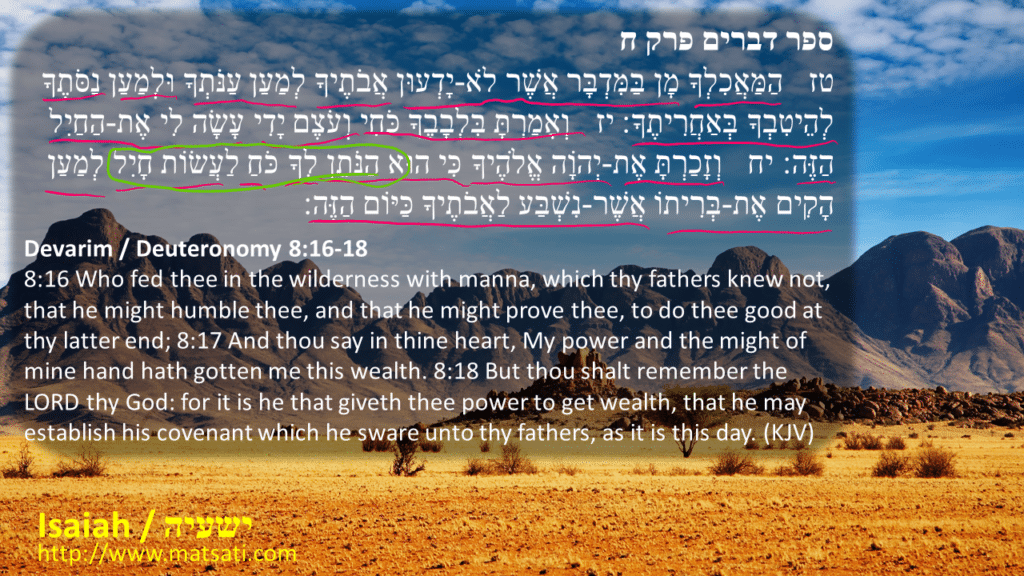
ספר דברים פרק ח
טז הַמַּאֲכִלְךָ מָן בַּמִּדְבָּר אֲשֶׁר לֹא-יָדְעוּן אֲבֹתֶיךָ לְמַעַן עַנֹּתְךָ וּלְמַעַן נַסֹּתֶךָ לְהֵיטִבְךָ בְּאַחֲרִיתֶךָ: יז וְאָמַרְתָּ בִּלְבָבֶךָ כֹּחִי וְעֹצֶם יָדִי עָשָֹה לִי אֶת-הַחַיִל הַזֶּה: יח וְזָכַרְתָּ אֶת-יְהוָֹה אֱלֹהֶיךָ כִּי הוּא הַנֹּתֵן לְךָ כֹּחַ לַעֲשֹוֹת חָיִל לְמַעַן הָקִים אֶת-בְּרִיתוֹ אֲשֶׁר-נִשְׁבַּע לַאֲבֹתֶיךָ כַּיּוֹם הַזֶּה:
Devarim / Deuteronomy 8:16-18
8:16 Who fed thee in the wilderness with manna, which thy fathers knew not, that he might humble thee, and that he might prove thee, to do thee good at thy latter end; 8:17 And thou say in thine heart, My power and the might of mine hand hath gotten me this wealth. 8:18 But thou shalt remember the LORD thy God: for it is he that giveth thee power to get wealth, that he may establish his covenant which he sware unto thy fathers, as it is this day. (KJV)
We also note what is written in Devarim / Deuteronomy 17:16-17 how the Torah teaches us that a king is not to accumulate wealth in chariots and horses, in military power, etc under the conclusion that this could lead the king away from God. We read the history about king Solomon, how this happened to him. (1 Kings 10:26-11:8) Solomon married women from many nations, and these women and great wealth led him away from God to adopt idolatry, the joining of one’s self to foreign gods. The idea is idolatry is man making God in his own image. According to Parashat Ekev, it is the Lord God who sustains us, and He is the one who gives us the strength to make wealth, meaning that we are given the ability to work hard, and this is so God can confirm the covenant he swore to Abraham, Isaac, and Jacob.
ספר ישעיה פרק ב
ט וַיִּשַּׁ֥ח אָדָ֖ם וַיִּשְׁפַּל־אִ֑ישׁ וְאַל־תִּשָּׂ֖א לָהֶֽם׃ י בּ֣וֹא בַצּ֔וּר וְהִטָּמֵ֖ן בֶּֽעָפָ֑ר מִפְּנֵי֙ פַּ֣חַד יְהוָ֔ה וּמֵהֲדַ֖ר גְּאֹנֽוֹ׃ יא עֵינֵ֞י גַּבְה֤וּת אָדָם֙ שָׁפֵ֔ל וְשַׁ֖ח ר֣וּם אֲנָשִׁ֑ים וְנִשְׂגַּ֧ב יְהוָ֛ה לְבַדּ֖וֹ בַּיּ֥וֹם הַהֽוּא׃
Isaiah 2:9 states, “And the mean man boweth down, (וַיִּשַּׁ֥ח אָדָ֖ם) And the great man humbleth himself: (וַיִּשְׁפַּל־אִ֑ישׁ) Therefore forgive them not. (וְאַל־תִּשָּׂ֖א לָהֶֽם)” and 2:10 “Enter into the rock, (בּ֣וֹא בַצּ֔וּר) and hide thee in the dust, (וְהִטָּמֵ֖ן בֶּֽעָפָ֑ר) For fear of the Lord, (מִפְּנֵי֙ פַּ֣חַד יְהוָ֔ה) and for the glory of his majesty. (וּמֵהֲדַ֖ר גְּאֹנֽוֹ)” and 2:11 “The lofty looks of man shall be humbled, (עֵינֵ֞י גַּבְה֤וּת אָדָם֙ שָׁפֵ֔ל) And the haughtiness of men shall be bowed down, (וְשַׁ֖ח ר֣וּם אֲנָשִׁ֑ים) And the Lord alone shall be exalted in that day. (וְנִשְׂגַּ֧ב יְהוָ֛ה לְבַדּ֖וֹ בַּיּ֥וֹם הַהֽוּא׃)” We note how the Torah speaks of the Lord God prospering His people. In Isaiah 2:9 Isaiah says וַיִּשַּׁ֥ח אָדָ֖ם which is simply “and man will be humbled,” where the KJV adds the “mean” man, probably to add clarity to the statement. This is the concept of being brought low, of pride being cast down (וַיִּשְׁפַּל־אִ֑ישׁ) and how this type of person will not be forgiven. (וְאַל־תִּשָּׂ֖א לָהֶֽם). Note how the word for forgiveness is not written explicitly. The word תִּשָּׂ֖א meaning bear or carry is used suggesting that it is God who lifts us up, He bears us up when we sin, and sustains us. It is interesting, this word תִּשָּׂ֖א reminds us of Parashat Ki Tisa. Specifically from Shemot / Exodus 32:29-35.
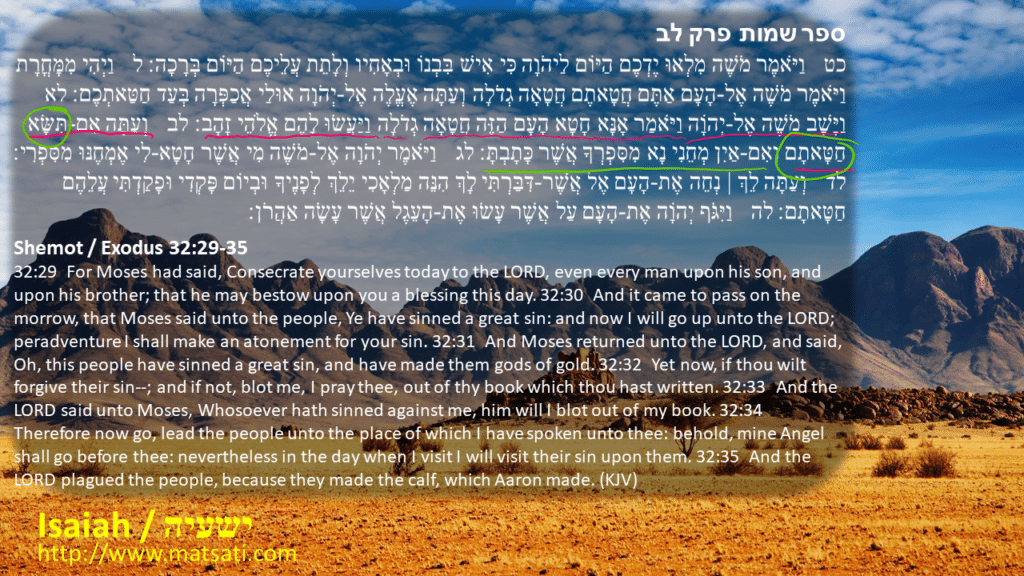
ספר שמות פרק לב
כט וַיֹּאמֶר מֹשֶׁה מִלְאוּ יֶדְכֶם הַיּוֹם לַיהֹוָה כִּי אִישׁ בִּבְנוֹ וּבְאָחִיו וְלָתֵת עֲלֵיכֶם הַיּוֹם בְּרָכָה: ל וַיְהִי מִמָּחֳרָת וַיֹּאמֶר מֹשֶׁה אֶל-הָעָם אַתֶּם חֲטָאתֶם חֲטָאָה גְדֹלָה וְעַתָּה אֶעֱלֶה אֶל-יְהֹוָה אוּלַי אֲכַפְּרָה בְּעַד חַטַּאתְכֶם: לא וַיָּשָׁב מֹשֶׁה אֶל-יְהוָֹה וַיֹּאמַר אָנָּא חָטָא הָעָם הַזֶּה חֲטָאָה גְדֹלָה וַיַּעֲשֹוּ לָהֶם אֱלֹהֵי זָהָב: לב וְעַתָּה אִם-תִּשָּׂא חַטָּאתָם וְאִם-אַיִן מְחֵנִי נָא מִסִּפְרְךָ אֲשֶׁר כָּתָבְתָּ: לג וַיֹּאמֶר יְהֹוָה אֶל-מֹשֶׁה מִי אֲשֶׁר חָטָא-לִי אֶמְחֶנּוּ מִסִּפְרִי: לד וְעַתָּה לֵךְ | נְחֵה אֶת-הָעָם אֶל אֲשֶׁר-דִּבַּרְתִּי לָךְ הִנֵּה מַלְאָכִי יֵלֵךְ לְפָנֶיךָ וּבְיוֹם פָּקְדִי וּפָקַדְתִּי עֲלֵהֶם חַטָּאתָם: לה וַיִּגֹּף יְהוָֹה אֶת-הָעָם עַל אֲשֶׁר עָשֹוּ אֶת-הָעֵגֶל אֲשֶׁר עָשָֹה אַהֲרֹן:
Shemot / Exodus 32:29-35
32:29 For Moses had said, Consecrate yourselves today to the LORD, even every man upon his son, and upon his brother; that he may bestow upon you a blessing this day. 32:30 And it came to pass on the morrow, that Moses said unto the people, Ye have sinned a great sin: and now I will go up unto the LORD; peradventure I shall make an atonement for your sin. 32:31 And Moses returned unto the LORD, and said, Oh, this people have sinned a great sin, and have made them gods of gold. 32:32 Yet now, if thou wilt forgive their sin–; and if not, blot me, I pray thee, out of thy book which thou hast written. 32:33 And the LORD said unto Moses, Whosoever hath sinned against me, him will I blot out of my book. 32:34 Therefore now go, lead the people unto the place of which I have spoken unto thee: behold, mine Angel shall go before thee: nevertheless in the day when I visit I will visit their sin upon them. 32:35 And the LORD plagued the people, because they made the calf, which Aaron made. (KJV)
Previously, Moshe ascended the mountain to get the ten words, and then returned to find the people had made a golden calf and had sinned before God. Moshe returns to the mountain of Sinai and then speaks to the Lord about forgiving the people. Here we find Moshe asking for forgiveness on behalf of the people saying, לב וְעַתָּה אִם-תִּשָּׂא חַטָּאתָם וְאִם-אַיִן מְחֵנִי נָא מִסִּפְרְךָ אֲשֶׁר כָּתָבְתָּ: 32:32 Yet now, if thou wilt forgive their sin–; and if not, blot me, I pray thee, out of thy book which thou hast written. (KJV) Here we find the same word תִּשָּׂא which means to “carry, lift, raise, bring, take, to bear up.” The concept here is of the Lord God bearing up, or lifting up the people. This provides us with the imagery of the Lord God supporting us, bringing us from place to place, and as the Torah states according to Parashat Ekev, He is the one who gives us strength to work and make a living! The source of the greatness of man, in any way, shape, or form is due to the Lord God. This is how Parashat Ki Tisa is explaining God’s role in the people. We also get a picture of the role of Mashiakh, to give his life for another, and to bear the sins of the people. A parallel to the priesthood as the Mashiakh, the anointed one of God, bears the sins of the people to make atonement before God in the Tabernacle. Note here in Isaiah 2:9, Isaiah says וְאַל־תִּשָּׂ֖א לָהֶֽם “forgive them not.” At this point in the history of Israel, the people have sinned for such a long time, and lived unrepentantly for so long, their pride, their lack of humility, God Himself will cause them to be humbled, their eyes cast down, etc. This humbling is to be feared as Isaiah continues saying, Isaiah 2:10 “Enter into the rock, (בּ֣וֹא בַצּ֔וּר) and hide thee in the dust, (וְהִטָּמֵ֖ן בֶּֽעָפָ֑ר) For fear of the Lord, (מִפְּנֵי֙ פַּ֣חַד יְהוָ֔ה) and for the glory of his majesty. (וּמֵהֲדַ֖ר גְּאֹנֽוֹ)” Because of pride, which Isaiah describes as lofty looks עֵינֵ֞י גַּבְה֤וּת with eyes (עֵינֵ֞י) written in the construct form, and גַּבְה֤וּת from the root גבה meaning “to be high, exalted, haughty” This pride of the eyes must be humbled, and the prophet warns to hide from this. The idea of hiding among the rocks, or among the dust of the earth, is due to the fear of the Lord, recognizing that one must humble themselves to the call of God. Isaiah says that only God will be exalted, וְנִשְׂגַּ֧ב יְהוָ֛ה לְבַדּ֖וֹ בַּיּ֥וֹם הַהֽוּא ”the Lord alone shall be exalted in that day.” Simply put, the idea of pride is as lifting or elevating one’s self up in a position of being God, assuming all of the things that we have are by the work of our own hands. This is the danger of believing in one’s own heart that he or she is the source of his or her blessing, just as the Torah warns us in Devarim / Deuteronomy 8, יז וְאָמַרְתָּ בִּלְבָבֶךָ כֹּחִי וְעֹצֶם יָדִי עָשָֹה לִי אֶת-הַחַיִל הַזֶּה 8:17 And thou say in thine heart, My power and the might of mine hand hath gotten me this wealth. (KJV) The punishment for making oneself a god of his own making, is to be removed from the presence of the One True God. The reason is that this is a denial of the whole purpose of God making man in His image, so that we can reflect His qualities, mercy, peace, justice, righteousness, holiness, and truth. Without seeking these things there is no fellowship with God. This was why God had sent His son Yeshua, in the fashion of Mashiakh, who bore our sins. (John 3:16, 3:36) This is consistent with what we read in John 3:36, הַמַּאֲמִין בַּבֵּן יֵשׁ לוֹ חַיֵּי עוֹלָם, אַךְ הַמְסָרֵב לְהַאֲמִין בַּבֵּן לֹא יִרְאֶה חַיִּים, אֶלָּא חֲרוֹן אֱלֹהִים חָל עָלָיו.״ literally, “the one who believes in the son will have everlasting life, and the one who does not believe in the son will not see life and the wrath of God abides on him.” Faith helps us to understand the truth of God, to understand the purpose of His words, and of our hearing the Lord God speak to us in and through His Word. The point of what these words of Isaiah are saying, is of our recognizing the need for the mercy and grace of God in our lives! This causes us to seek God, to study His Word, and to live our lives for Him. The biggest application for us derived from these things is that we are to pray and to seek the Lord to help us to live our lives for Him each day! (Colossians 3:23-24)
Rabbinic Literature on Isaiah 2:1-11
The Aramaic Targum Jonathan translates Isaiah 2:1-11 in the following way:
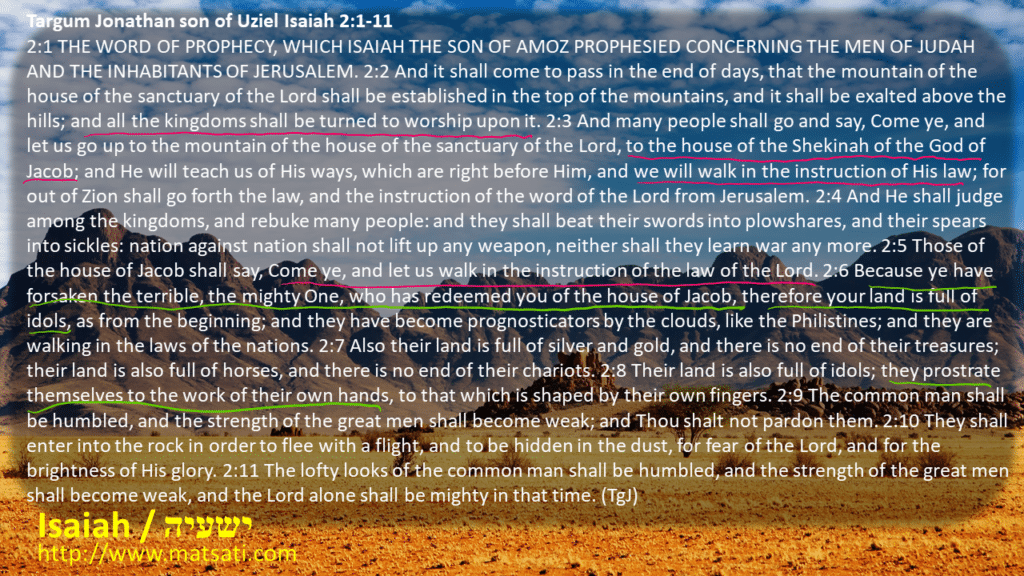
תרגום יונתן בן עוזיאל אל ישעיה פרק ב:א-יא
א פִתגָם נְבוּאָה דְאִתנַבִי יְשַעיָה בַר אָמֹוץ עַל אְנָש יְהוּדָה וְיָתְבֵי יְרוּשְלַם׃ ב וִיהֵי בְסֹוף יֹומַיָא מְתֻקַן יְהֵי טוּר בֵית מַקדְשָא דַיוי בְרֵיש טוּרַיָא וּמנַטַל מֵרָמָתָא וְיִתפַניָין לְמִפלַח עְלֹוהִי כָל מַלכְוָתָא׃ ג וִיהָכוּן עַמְמִין סַגִיאִין וְיֵימְרוּן אֵיתֹו וְנִיסַק לְטוּר בֵית מַקדְשָא דַיוי לְבֵית שְכִינַת אְלָהֵיה דְיַעְקֹב וְיַלְפִינַנָא מֵאֹורחָן דְתָקְנָן קֳדָמֹוהִי וּנהָך בְאֻלפַן אֹורָיתֵיה אְרֵי מִצִיֹון תִיפֹוק אֹורָיתָא וְאֻלפָן פִתגָמָא דַיוי מִירוּשְלַם׃ ד וִידִין בֵין מַלכְוָותָא וְיֹוכַח לְעַמְמִין סַגִיאִין וִיעָפְפוּן סֵיפֵיהֹון לְסִיכִין וּמֹורָניָתְהֹון לְמַגְלִין לָא יִטֹול עַם בְאַפֵי עַם זֵין וְלָא יִתאַלפוּן עֹוד מִיבְכֵין קְרָבָא׃ ה יֵימְרוּן בֵית יַעְקֹב אֵיתֹו וּנהָך בְאֻלפַן אֹורָיתָא דַיוי׃ ו אְרֵי שְבַקתוּן דַחלַת תַקִיפָא דַהְוָה פָרִיק לְכֹון דְבֵית יַעְקֹב אְרֵי אִתמְלִיאַת אֲרַעכֹון טָעְוָן כִיד מִלְקַדמִין וְעָנְנִין כִפלִשתָאֵי וּבנִמֹוסֵי עַמְמַיָא אָזְלִין׃ ז וְאִתמְלִיאַת אְרַעהֹון כְסַף וּדהַב וְלֵית סֹוף לְגִנזֹוהִי וְאִתמְלִיאַת אְרַעהֹון סוּסָוָון וְלֵית סֹוף לִרתִכֹוהִי׃ ח וְאִתמְלִיאַת אְרַעהֹון טָעְוָון לְעֹובָד יְדֵיהֹון סָגְדִין לִדאַתקִינָא אַצבְעָתְהֹון׃ ט וְיִמאַך אְנָשָא וְיִחלַש תְקֹוף גוּברִין וְלָא תִשבֹוק לְהֹון׃ י יֵיעְלוּן לְמִערַק במערק בְטִנָרַיָא וּלאִיטְמָרָא בַעַפרָא מִן קֳדָם דְחִילָא יוי וּמִזִיו יְקָרֵיה׃ יא עֵינֵי רָמוּת אְנָשָא יִמאְכָן וְיִחלַש תְקֹוף גֻברִין וְתַקִיף יוי בִלחֹודֹוהִי בְעִידָנָא הַהוּא׃
Targum Jonathan son of Uziel Isaiah 2:1-11
2:1 THE WORD OF PROPHECY, WHICH ISAIAH THE SON OF AMOZ PROPHESIED CONCERNING THE MEN OF JUDAH AND THE INHABITANTS OF JERUSALEM. 2:2 And it shall come to pass in the end of days, that the mountain of the house of the sanctuary of the Lord shall be established in the top of the mountains, and it shall be exalted above the hills; and all the kingdoms shall be turned to worship upon it. 2:3 And many people shall go and say, Come ye, and let us go up to the mountain of the house of the sanctuary of the Lord, to the house of the Shekinah of the God of Jacob; and He will teach us of His ways, which are right before Him, and we will walk in the instruction of His law; for out of Zion shall go forth the law, and the instruction of the word of the Lord from Jerusalem. 2:4 And He shall judge among the kingdoms, and rebuke many people: and they shall beat their swords into plowshares, and their spears into sickles: nation against nation shall not lift up any weapon, neither shall they learn war any more. 2:5 Those of the house of Jacob shall say, Come ye, and let us walk in the instruction of the law of the Lord. 2:6 Because ye have forsaken the terrible, the mighty One, who has redeemed you of the house of Jacob, therefore your land is full of idols, as from the beginning; and they have become prognosticators by the clouds, like the Philistines; and they are walking in the laws of the nations. 2:7 Also their land is full of silver and gold, and there is no end of their treasures; their land is also full of horses, and there is no end of their chariots. 2:8 Their land is also full of idols; they prostrate themselves to the work of their own hands, to that which is shaped by their own fingers. 2:9 The common man shall be humbled, and the strength of the great men shall become weak; and Thou shalt not pardon them. 2:10 They shall enter into the rock in order to flee with a flight, and to be hidden in the dust, for fear of the Lord, and for the brightness of His glory. 2:11 The lofty looks of the common man shall be humbled, and the strength of the great men shall become weak, and the Lord alone shall be mighty in that time. (TgJ)
The Targum opens saying the following, א פִתגָם נְבוּאָה דְאִתנַבִי יְשַעיָה בַר אָמֹוץ עַל אְנָש יְהוּדָה וְיָתְבֵי יְרוּשְלַם׃ ב וִיהֵי בְסֹוף יֹומַיָא מְתֻקַן יְהֵי טוּר בֵית מַקדְשָא דַיוי בְרֵיש טוּרַיָא וּמנַטַל מֵרָמָתָא וְיִתפַניָין לְמִפלַח עְלֹוהִי כָל מַלכְוָתָא׃ 2:1 The word of prophecy, which Isaiah the son of Amoz prophesied concerning the men of Judah and the inhabitants of Jerusalem. 2:2 And it shall come to pass in the end of days, that the mountain of the house of the sanctuary of the Lord shall be established in the top of the mountains, and it shall be exalted above the hills; and all the kingdoms shall be turned to worship upon it. (TgJ) The TgJ interprets the words of Isaiah in a similar manner and states וְיִתפַניָין לְמִפלַח עְלֹוהִי כָל מַלכְוָתָא “and they will turn to work upon, all the kingdoms.” This idea of turning parallel to repentance, and draws on the idea of worship, the likely reason TgJ interprets “And all nations shall flow unto it. (וְנָהֲר֥וּ אֵלָ֖יו כָּל־הַגּוֹיִֽם)“ as the nations go for the purpose of worshiping the Lord! Ibn Ezra states the following concerning these Scriptures.
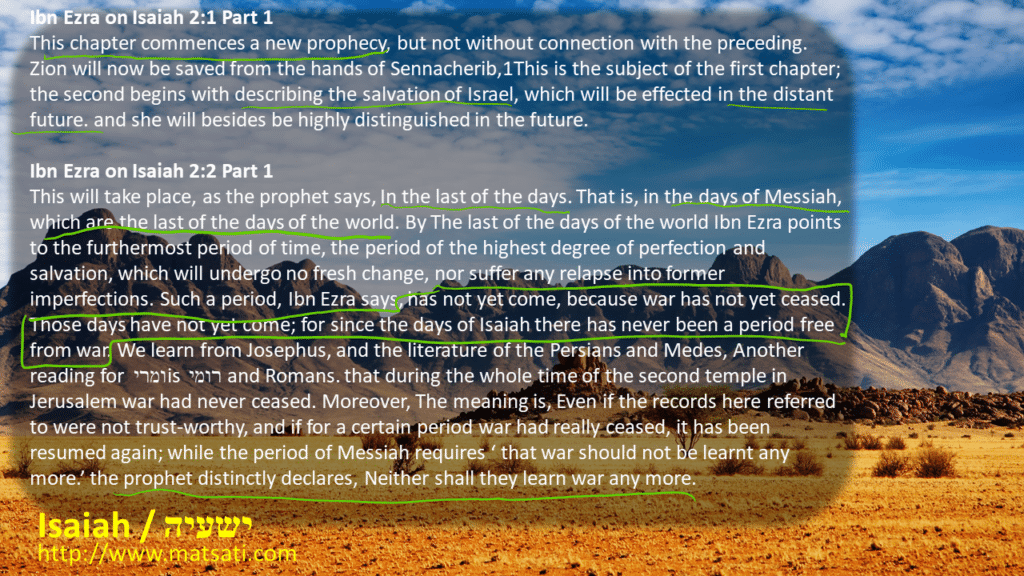
Ibn Ezra on Isaiah 2:1 Part 1
This chapter commences a new prophecy, but not without connection with the preceding. Zion will now be saved from the hands of Sennacherib,1This is the subject of the first chapter; the second begins with describing the salvation of Israel, which will be effected in the distant future. and she will besides be highly distinguished in the future.
Ibn Ezra looks at the present day reality of Isaiah’s words. In Judaism, salvation is closely related to the idea of redemption. It is here that Ibn Ezra does not see Isaiah 2 as eschotological in nature, but of a more recent, or near future fulfilment. And according to God’s mercy and grace towards His people, he will highly exalt the people giving them a very high distinguished position as a light to the nations.
Ibn Ezra on Isaiah 2:2 Part 1
This will take place, as the prophet says, In the last of the days. That is, in the days of Messiah, which are the last of the days of the world.2By The last of the days of the world Ibn Ezra points to the furthermost period of time, the period of the highest degree of perfection and salvation, which will undergo no fresh change, nor suffer any relapse into former imperfections. Such a period, Ibn Ezra says, has not yet come, because war has not yet ceased. Those days have not yet come; for since the days of Isaiah there has never been a period free from war. We learn from Josephus, and the literature of the Persians and Medes,3Another reading for ומרי is רומי and Romans. that during the whole time of the second temple in Jerusalem war had never ceased. Moreover,4The meaning is, Even if the records here referred to were not trust-worthy, and if for a certain period war had really ceased, it has been resumed again; while the period of Messiah requires ‘ that war should not be learnt any more.’ the prophet distinctly declares, Neither shall they learn war any more.
Ibn Ezra on Isaiah 2:2 Part 3
ונהרו And they will flow. Root, נהר ‘to flow’; comp. נהר river, which is so called on account of its flowing motion.
Here Ibn Ezra says Isaiah looks towards “the days of the Messiah.” If we search this phrase on Sefaria, produces 227 search results: Tanakh (4), Mishnah (4), Talmud (32), Midrash (40), Halakhah (26), Kabbalah (5), Liturgy (46), Jewish Thought (16), Chasidut (7), Musar (6), Reference (2), Targum (3), Tanakh Commentary (31), Mishnah Commentary (3), Talmud Commentary (2). The “Reference (2)” is found in the book “The Jewish spiritual heroes,” by Gershom Bader. New York, N.Y. 1940. A review of the Talmudic passages reveals “the days of Messiah” as referring to the messianic age and the olam habah. It appears Ibn Ezra interprets these events as taking place at the consummation of history or at least near that point in time. The Jewish thought on this is that “the period of the highest degree of perfection and salvation, which will undergo no fresh change, nor suffer any relapse into former imperfections.” This is the idea that God is able to work in our lives to such a great extent as we will not be at war. This parallels the NT concept of the Messiah bringing peace into the hearts of men. This is exactly what God does in Yeshua the Messiah, those who abide in Him will have these things! Note Ibn Ezra looks at this saying that the tell-tale-sign of the Messianic age is that the kingdoms of the earth will not learn war any more.
The Targum continues saying, ג וִיהָכוּן עַמְמִין סַגִיאִין וְיֵימְרוּן אֵיתֹו וְנִיסַק לְטוּר בֵית מַקדְשָא דַיוי לְבֵית שְכִינַת אְלָהֵיה דְיַעְקֹב וְיַלְפִינַנָא מֵאֹורחָן דְתָקְנָן קֳדָמֹוהִי וּנהָך בְאֻלפַן אֹורָיתֵיה אְרֵי מִצִיֹון תִיפֹוק אֹורָיתָא וְאֻלפָן פִתגָמָא דַיוי מִירוּשְלַם׃ 2:3 And many people shall go and say, Come ye, and let us go up to the mountain of the house of the sanctuary of the Lord, to the house of the Shekinah of the God of Jacob; and He will teach us of His ways, which are right before Him, and we will walk in the instruction of His law; for out of Zion shall go forth the law, and the instruction of the word of the Lord from Jerusalem. (TgJ) Note Isaiah words stated:
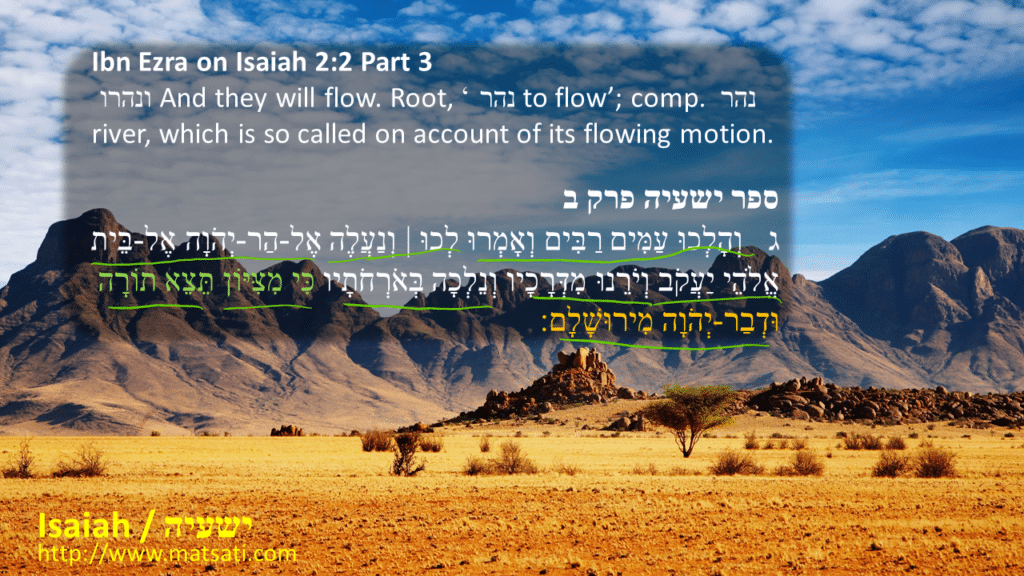
2:3 “And many people shall go and say, (וְֽהָלְכ֞וּ עַמִּ֣ים רַבִּ֗ים וְאָמְרוּ֙) Come ye, and let us go up to the mountain of the Lord, (לְכ֣וּ׀ וְנַעֲלֶ֣ה אֶל־הַר־יְהוָ֗ה) To the house of the God of Jacob; (אֶל־בֵּית֙ אֱלֹהֵ֣י יַעֲקֹ֔ב) And he will teach us of his ways, (וְיֹרֵ֙נוּ֙ מִדְּרָכָ֔יו) And we will walk in his paths: (וְנֵלְכָ֖ה בְּאֹרְחֹתָ֑יו) For out of Zion (כִּ֤י מִצִּיּוֹן֙) shall go forth the law, (תֵּצֵ֣א תוֹרָ֔ה) And the word of the Lord from Jerusalem. (וּדְבַר־יְהוָ֖ה מִירוּשָׁלִָֽם)”
TgJ speaks of the תוֹרָ֔ה Torah going forth from the sanctuary and the house of the Shekinah of God. The Shekinah Glory is a visible manifestation of God on earth, whose presence is portrayed through a natural occurrence. The word shekinah is a Hebrew name meaning “dwelling” or “one who dwells.” Shekinah Glory means “He caused to dwell,” referring to the divine presence of God. There is a parallel here to the indwelling of the presence of God in our hearts. (1 Corinthians 3:16-17, 6:19-20, 7:23) The Talmud makes the following points concerning Isaiah 2:3.
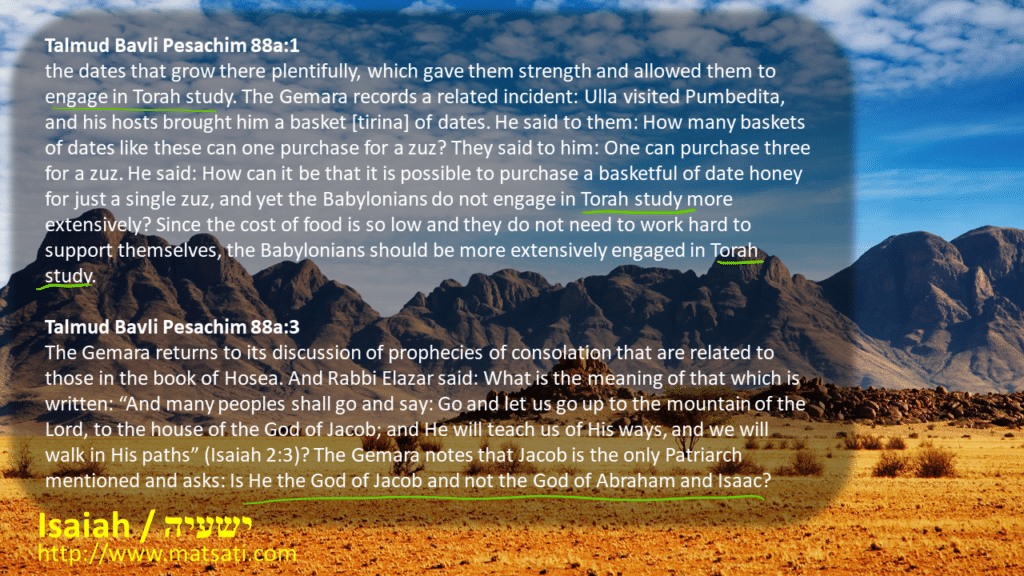
Talmud Bavli Pesachim 88a:1
the dates that grow there plentifully, which gave them strength and allowed them to engage in Torah study. The Gemara records a related incident: Ulla visited Pumbedita, and his hosts brought him a basket [tirina] of dates. He said to them: How many baskets of dates like these can one purchase for a zuz? They said to him: One can purchase three for a zuz. He said: How can it be that it is possible to purchase a basketful of date honey for just a single zuz, and yet the Babylonians do not engage in Torah study more extensively? Since the cost of food is so low and they do not need to work hard to support themselves, the Babylonians should be more extensively engaged in Torah study.
Talmud Bavli Pesachim 88a:3
The Gemara returns to its discussion of prophecies of consolation that are related to those in the book of Hosea. And Rabbi Elazar said: What is the meaning of that which is written: “And many peoples shall go and say: Go and let us go up to the mountain of the Lord, to the house of the God of Jacob; and He will teach us of His ways, and we will walk in His paths” (Isaiah 2:3)? The Gemara notes that Jacob is the only Patriarch mentioned and asks: Is He the God of Jacob and not the God of Abraham and Isaac?
The idea here is that we are to be always engaged in the study of God’s Word. The illustration given in the Talmud is that of working, and when there is great blessing in the cost of food, in this case “dates,” one does not need to work so hard to make a living for his family, he can take the extra time to study Torah, an analogy to all of Scripture (the Bible). Why do you think it is so important to study God’s Word? Reasons why studying God’s Word is so vital, (i) To know the will of God, knowing the will of God is important especially when we are praying. (ii) To renew our mind like Paul wrote in Romans 12:2 so that we can be reminded of the power and mercy of God, and so we are not conformed to the pattern of this world but transformed by the renewing of our minds in the Word of God. (iii) The Word speaks to us in times of trouble giving us hope. The rabbis go on to ask why does this verse in Isaiah 2:3 only mention the patriarch Jacob? An interesting interpretation based upon the NT text we might draw the following conclusions. Abraham and Isaac represent Father and Son respectively, Jacob represents the Holy Spirit and the Age of the Holy Spirit. And the story of the 12 sons of Jacob represents God’s people who are to be saved in the last days. This seems to be consistent with what we are reading here in Isaiah 2.
Isaiah 2:4 goes on saying the following, ד וִידִין בֵין מַלכְוָותָא וְיֹוכַח לְעַמְמִין סַגִיאִין וִיעָפְפוּן סֵיפֵיהֹון לְסִיכִין וּמֹורָניָתְהֹון לְמַגְלִין לָא יִטֹול עַם בְאַפֵי עַם זֵין וְלָא יִתאַלפוּן עֹוד מִיבְכֵין קְרָבָא׃ 2:4 And He shall judge among the kingdoms, and rebuke many people: and they shall beat their swords into plowshares, and their spears into sickles: nation against nation shall not lift up any weapon, neither shall they learn war any more. (TgJ) The connection here is to the Messianic Age, and the proof of this time period is to the nations no longer learning the art of war. Ibn Ezra states the following concerning these things.
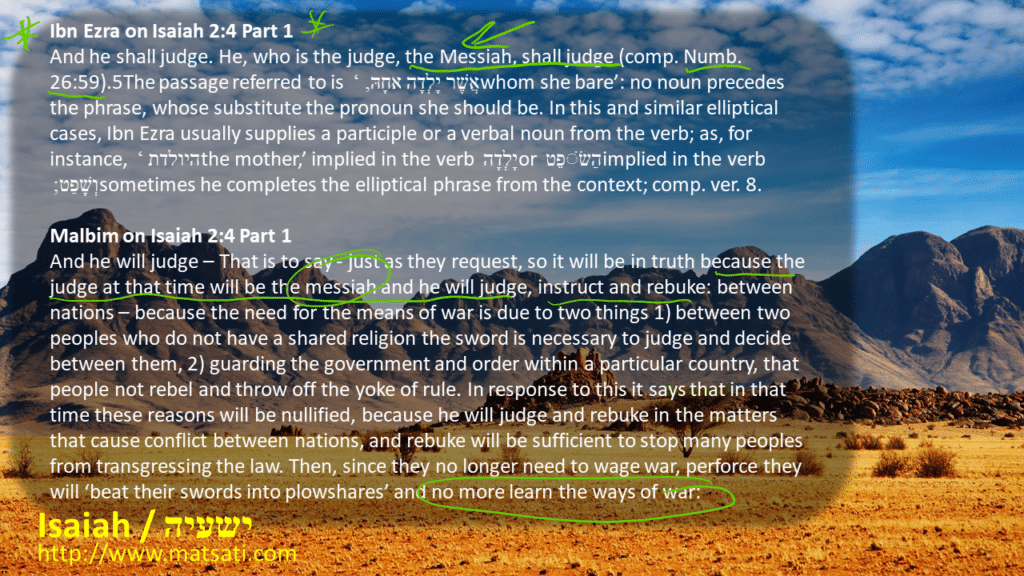
Ibn Ezra on Isaiah 2:4 Part 1
And he shall judge. He, who is the judge, the Messiah, shall judge (comp. Numb. 26:59).5The passage referred to is אֲשֶׁר יָלְדָה אׂחָהּ, ‘ whom she bare’: no noun precedes the phrase, whose substitute the pronoun she should be. In this and similar elliptical cases, Ibn Ezra usually supplies a participle or a verbal noun from the verb; as, for instance, היולדת ‘ the mother,’ implied in the verb יָלְדָה or הַשׁׂפֵט implied in the verb וְשָׁפַט; sometimes he completes the elliptical phrase from the context; comp. ver. 8.
Here an elliptical phrase is a clause in which something is omitted, usually because it is understood. What exactly is Ibn Ezra trying to draw out for us? He references Bamidbar / Numbers 26:59 וְשֵׁ֣ם׀ אֵ֣שֶׁת עַמְרָ֗ם יוֹכֶ֙בֶד֙ בַּת־לֵוִ֔י אֲשֶׁ֨ר יָלְדָ֥ה אֹתָ֛הּ לְלֵוִ֖י בְּמִצְרָ֑יִם וַתֵּ֣לֶד לְעַמְרָ֗ם אֶֽת־אַהֲרֹן֙ וְאֶת־מֹשֶׁ֔ה וְאֵ֖ת מִרְיָ֥ם אֲחֹתָֽם׃ 26:59 And the name of Amram’s wife was Jochebed, the daughter of Levi, whom her mother bare to Levi in Egypt: and she bare unto Amram Aaron and Moses, and Miriam their sister. (KJV) Here Ibn Ezra is drawing a conclusion on the phrase וִידִין בֵין מַלכְוָותָא “and he shall judge” where the “He” is not specified, but the conclusion is this is the Messiah. The parallel is to the text from Bamidbar / Numbers on the judge being the anointed one of God (Mashiakh, משיח) and the son of Amram’s wife, Aaron, the eventual Cohen HaGadol (High Priest).
Malbim on Isaiah 2:4 Part 1
And he will judge – That is to say – just as they request, so it will be in truth because the judge at that time will be the messiah and he will judge, instruct and rebuke: between nations – because the need for the means of war is due to two things 1) between two peoples who do not have a shared religion the sword is necessary to judge and decide between them, 2) guarding the government and order within a particular country, that people not rebel and throw off the yoke of rule. In response to this it says that in that time these reasons will be nullified, because he will judge and rebuke in the matters that cause conflict between nations, and rebuke will be sufficient to stop many peoples from transgressing the law. Then, since they no longer need to wage war, perforce they will ‘beat their swords into plowshares’ and no more learn the ways of war:
It is interesting when the Messiah is involved, there is no need for war, there is peace, and the Messiah judges between the peoples. Based upon these rabbinic commentaries, the Messiah is involved multi-nationally. The work of the Messiah is not exclusive to Israel only, but also of the entire world! Note how God’s Peace Is different from the world’s peace! These Scriptures provide us with an insight into the role of the Messiah in the messianic age. A fundamental principle of peace is given to the world. Now the rabbis speak of the two reasons why there is war. One of them is not having the same religion. This concept is not necessarily true, as other religions such as Islam, have a lot of fighting within and among themselves across boarders in different countries. Even in Christianity there are different factions fighting amongst themselves, and there have been wars in church history. Judaism also does not prevent infighting and wars, all we have to do is look simply at David and Saul in the history of Israel. There is something fundamentally different here based on Isaiah’s words that the Messiah will do to give peace to not just Israel, but the entire world. In the NT we read something Yeshua said according to John 14:27.
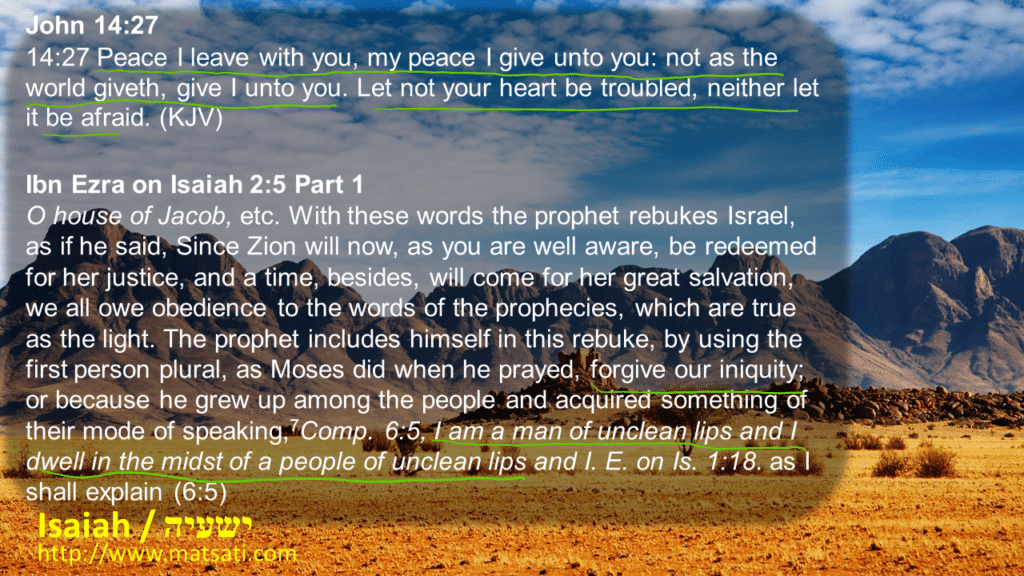
John 14:27
14:27 Peace I leave with you, my peace I give unto you: not as the world giveth, give I unto you. Let not your heart be troubled, neither let it be afraid. (KJV)
Yeshua says that He gives peace, but not as the world does. This is consistent with what we are reading in Isaiah. The peace offered by the world is an empty promise and can only bring temporary comfort. God’s peace is a permanent peace offered by the only One who can be trusted to keep his Word and heal our sin. Peace is the state of which one is not at war or of being free from conflict. There are times when we are not at peace even when we are not at war, examples of this is when we have difficulties in relationships, health problems, and financial problems. The peace from war is disrupted and replaced with this chaos. The God of Israel offers peace in the midst of chaos. His peace does not change our circumstances, it comes in spite of our circumstances. Paul writes of this saying that we “once were far off” (Ephesians 2:13) and now we are reconciled unto God through the Messiah Yeshua. We are offered peace with God through faith. Our faith in Yeshua addresses something that the world ignores, the recognition of sin, the need for God’s help, Teshuvah (Repentance), and humbleness before a powerful God! Yeshua’s sacrifice and our faith in Him bridges the gap that sin creates between us and God in heaven. When Yeshua took our punishment, he in turn gave us peace with God. All of these things are the way in which the Messiah would bring a lasting peace in the hearts of men around the world.
Isaiah 2:5 states, ה יֵימְרוּן בֵית יַעְקֹב אֵיתֹו וּנהָך בְאֻלפַן אֹורָיתָא דַיוי׃ 2:5 Those of the house of Jacob shall say, Come ye, and let us walk in the instruction of the law of the Lord. (TgJ) Something to note about the TgJ translation from the phrase, וּנהָך בְאֻלפַן אֹורָיתָא דַיוי “let us walk in the instruction of the Lord.” Notice the word “Torah” is missing, the word אֹורָיתָא is used meaning “teaching” or “instruction.” This word can also mean “law” but the point is the Torah is to be interpreted as the instruction of God in our lives. Ibn Ezra states the following concerning verse 5.
Ibn Ezra on Isaiah 2:5 Part 1
O house of Jacob, etc. With these words the prophet rebukes Israel, as if he said, Since Zion will now, as you are well aware, be redeemed for her justice, and a time, besides, will come for her great salvation, we all owe obedience to the words of the prophecies, which are true as the light. The prophet includes himself in this rebuke, by using the first person plural, as Moses did when he prayed, forgive our iniquity; or because he grew up among the people and acquired something of their mode of speaking,7Comp. 6:5, I am a man of unclean lips and I dwell in the midst of a people of unclean lips and I. E. on Is. 1:18. as I shall explain (6:5)
Ibn Ezra claims that Israel will be redeemed for her justice. This is interesting as without the Lord working in the lives of the men and women of that time (and in our time) would there be a true turning from injustice to walk in justice before God? God demands justice. He requires that wrong be punished and right be rewarded. God’s justice has been at work in this world ever since the creation of mankind. God’s justice is the result of his nature, whereby he works to do that which is righteous and true. Mishley / Proverbs 24:12 states “Shall not he render to every man according to his works?” God is an impartial judge. He judges the cause. Men often judge the person, but not the cause; which is not justice. We note how the Messiah according to the previous verses will be the one who judges. Note something Yeshua said while he was here on earth according to John 12:47-50.
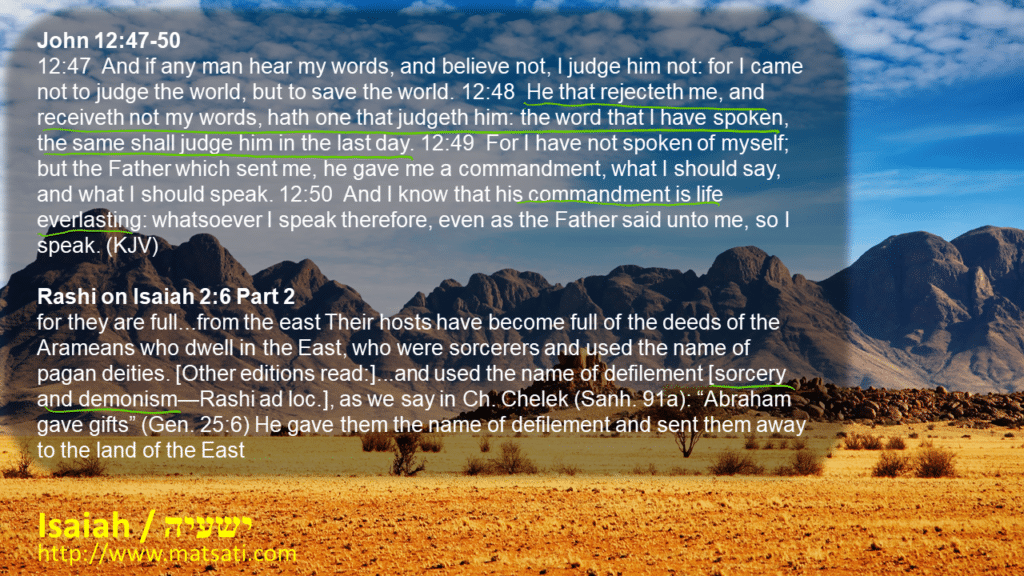
John 12:47-50
12:47 And if any man hear my words, and believe not, I judge him not: for I came not to judge the world, but to save the world. 12:48 He that rejecteth me, and receiveth not my words, hath one that judgeth him: the word that I have spoken, the same shall judge him in the last day. 12:49 For I have not spoken of myself; but the Father which sent me, he gave me a commandment, what I should say, and what I should speak. 12:50 And I know that his commandment is life everlasting: whatsoever I speak therefore, even as the Father said unto me, so I speak. (KJV)
Here Yeshua says that he did not come to judge. Yet the rabbis speak to the Messiah judging and bringing peace. The point of Yeshua’s words was that he was speaking of the present work, of laying his life down for ours. He does say that the words He speaks will be the judge, and the commandment of God is life everlasting. The significance of these things is that Yeshua states explicitly that he is sent of the Father in heaven, and what he says comes directly from the Father. These things reveal to us the deep connection between the Messiah and God in heaven, and how faith in the Messiah causes us to receive the mercy, grace, and peace of God! The question for us today though is “what happens if we were to forsake God’s Word?” One of the major themes throughout the Scriptures that God speaks to us concerning is that we are to trust in Him, we are not to trust in man or in the strength / power of the flesh / body. Jeremiah 17:5 makes it clear that God expects our trust to be in Him and not mankind. He goes on to say that the consequence for trusting in mankind is that our hearts will turn away from the Lord. What a sad and devastating place to be! Isaiah 2:22 states “2:22 Stop trusting in man, who has but a breath in his nostrils. Of what account is he?” (NIV) When we consider Jeremiah 17, trusting in man brings a curse upon our lives and we will reap the consequences. This is paralleled to what Isaiah is speaking of the people forsaking God in heaven according to Isaiah 2:6, ו אְרֵי שְבַקתוּן דַחלַת תַקִיפָא דַהְוָה פָרִיק לְכֹון דְבֵית יַעְקֹב אְרֵי אִתמְלִיאַת אֲרַעכֹון טָעְוָן כִיד מִלְקַדמִין וְעָנְנִין כִפלִשתָאֵי וּבנִמֹוסֵי עַמְמַיָא אָזְלִין׃ 2:6 Because ye have forsaken the terrible, the mighty One, who has redeemed you of the house of Jacob, therefore your land is full of idols, as from the beginning; and they have become prognosticators by the clouds, like the Philistines; and they are walking in the laws of the nations. (TgJ) The TgJ adds the words describing the power of God, as the “terrible, the mighty One, who has redeemed you.” We note that forsaking the Lord according to the TgJ is שְבַקתוּן דַחלַת “to leave the fear of God.” This leaving of the fear of God leads to the filling of the land with idolatry. This concept of not trusting in man, to “cease from man” is synonymous to ceasing from idolatry. Then is paralleled to וּבנִמֹוסֵי עַמְמַיָא אָזְלִין “and in the law of the peoples to go / walk.” Notice the connection here, to be unfaithful to God and unrepentant, is synonymous to trusting in man, and is a form of idolatry. These things lead to the land, the place in which we live being filled with idols. Note also that these idols do not necessarily have to be physical statues of false gods. Idolatry is a function that which we seek and desire over a relationship with God! We note how Rashi interprets these things.
Rashi on Isaiah 2:6 Part 2
for they are full…from the east Their hosts have become full of the deeds of the Arameans who dwell in the East, who were sorcerers and used the name of pagan deities. [Other editions read:]…and used the name of defilement [sorcery and demonism—Rashi ad loc.], as we say in Ch. Chelek (Sanh. 91a): “Abraham gave gifts” (Gen. 25:6) He gave them the name of defilement and sent them away to the land of the East
Rashi on Isaiah 2:6 Part 3
and with children of gentiles they please themselves They cohabit with the daughters of the heathens and mingle with them, and they would bear children to them, with whom they are always pleased, and they occupy themselves [with them] and long for them and bother with them. This is an expression similar to [that of] (Job 36:18) “lest he incite you because of abundance (בְּשֶׂפֶק)”
The TgJ translates Isaiah’s words saying וְעָנְנִין כִפלִשתָאֵי “soothsayers like the philistines.” Note how a soothsayer is a person supposed to be able to foresee the future. The philistines perform their predictions of the future by their idols or witchcraft. Rashi says they do so in the name of their deities. Rashi goes as far to say that they do so by the power of a demon through sorcery and this defiles them. This is paralleled to Bereshit / Genesis 25:6 which speaks of Abraham’s children that he had with other wives (not Sarah) and he gave them gifts and sent them away to distant lands. The purpose was so that Isaac would have the sole claim to the inheritance of God in the Promised Land. This parallel is as to seeking a distant land and by consequence a different kingdom. We are called to seek the Kingdom of God, to see the ways of God, and to walk in His truth, justice, righteousness, and holiness.
It is interesting how Rashi also speaks of cohabiting with the daughters of heathens and mingling with them. This idea of cohabiting is reminiscent of marriage, since Rashi is speaking of having children. When one is a child of God, who seeks to love the Lord God Almighty, and is married to one who does not care about the things of the Lord, this becomes a heavy thing upon such a person’s heart. There is no true intimacy, there is no true relationship with one’s spouse if there is no spiritual agreement. There is always the feeling of discontent, of heaviness, of the want for something more, and not being able to talk to one’s spouse about deeper spiritual things. When one is married to one who does not love the Lord, this is a very difficult thing, as even their outlook on the world is different, having a desire for the material things as opposed to the ways of God! If we do find a spouse who loves the Lord, great is the mercy of God to have brought such a blessing! There is no measure of wealth or power or pleasure that can replace such a wonderful gift from God!
Notice something about the next two verses, ז וְאִתמְלִיאַת אְרַעהֹון כְסַף וּדהַב וְלֵית סֹוף לְגִנזֹוהִי וְאִתמְלִיאַת אְרַעהֹון סוּסָוָון וְלֵית סֹוף לִרתִכֹוהִי׃ 2:7 Also their land is full of silver and gold, and there is no end of their treasures; their land is also full of horses, and there is no end of their chariots. ח וְאִתמְלִיאַת אְרַעהֹון טָעְוָון לְעֹובָד יְדֵיהֹון סָגְדִין לִדאַתקִינָא אַצבְעָתְהֹון׃ 2:8 Their land is also full of idols; they prostrate themselves to the work of their own hands, to that which is shaped by their own fingers. (TgJ) Note how Isaiah describes a land that is filled with treasures, but is full of idolatry. This reminds us of discernment. As the children of God we are given the Spirit of God to help us to know not just how to live our lives, and to bring to memory the Scriptures, but also to be discerning of truth. Wealth has the ability to hide the truth, to cloud one’s mind. We are given the ability to discern the spirit of a person, to distinguish between what is of God and what is not. The Greek word for discernment is diakrisis. This word describes being able to distinguish, discern, judge, or appraise a person, a statement, a situation, or an environment. This is described in the NT as the ability to distinguish between spirits like what we read in 1 Corinthians 12:10 and between good and evil in Hebrews 5:14. This gift from God helps us to be weary in times of danger to beware not to be led astray by false teachings. (Acts 5:3-6, 16:16-18, 1 Corinthians 12:10, 1 John 4:1) These things coupled with Isaiah warn us to not be deceived by wealth, but to trust in God and His provision. This is wisdom (חכמה) that God is giving us here in His word. The Greek word for wisdom is sophia and refers to having an intimate understanding of God’s Word and of His mitzvot (commandments) which result in holy and upright living. In the context of 1 Corinthians 12:8, it means to speak to the life of an individual or to a specific situation with great understanding and a righteous perspective, with the goal of guiding others toward a life of holiness and worship. Note how significant this is in relation to what we are reading in Isaiah. In Isaiah 1 the people were described as corruptors, those who lead others astray into sin. We are called, however, to live righteous and holy lives and to lead others in the way of holiness according to God’s Word. This is the beauty of God’s wisdom as the psalmist states, Tehillim / Psalms 111:10, רֵ֘אשִׁ֤ית חָכְמָ֨ה׀ יִרְאַ֬ת יְהוָ֗ה שֵׂ֣כֶל ט֖וֹב לְכָל־עֹשֵׂיהֶ֑ם תְּ֝הִלָּת֗וֹ עֹמֶ֥דֶת לָעַֽד׃ “The fear of the LORD is the beginning of wisdom; all those who practice it have a good understanding. His praise endures forever!” Here we are told that wisdom begins with the fear of God. It begins with knowing who we are as created beings, and being humble before our great God! This then leads to our seeking the Lord and practicing righteousness, this is the result of a life of wisdom. James tells us according to the NT that “the wisdom from above is first pure, then peaceable, gentle, open to reason, full of mercy and good fruits, impartial and sincere.” (James 3:17) This is the work of God in our lives! These things are given to God’s people for the purpose of imparting truth and understanding which should lead to holiness, righteousness, and praise / worship of God alone! The wisdom of God is not just about having knowledge, but of having a transformed life by the power of God!
Isaiah 2:7-8 states, ז וְאִתמְלִיאַת אְרַעהֹון כְסַף וּדהַב וְלֵית סֹוף לְגִנזֹוהִי וְאִתמְלִיאַת אְרַעהֹון סוּסָוָון וְלֵית סֹוף לִרתִכֹוהִי׃ 2:7 Also their land is full of silver and gold, and there is no end of their treasures; their land is also full of horses, and there is no end of their chariots. ח וְאִתמְלִיאַת אְרַעהֹון טָעְוָון לְעֹובָד יְדֵיהֹון סָגְדִין לִדאַתקִינָא אַצבְעָתְהֹון׃ 2:8 Their land is also full of idols; they prostrate themselves to the work of their own hands, to that which is shaped by their own fingers. (TgJ) We note how these people lacked wisdom. Even in the midst of great blessing, they lacked understanding. Rashi states the following concerning these verses.
Rashi on Isaiah 2:8 Part 1
they prostrate themselves Heb. ישתחוו. Although the form is future, it is to be rendered like מִשְׁתַּחֲוִים, they prostrate themselves.
Note how the people lacked a deep understanding of the holiness of God and the lack of holiness in their hearts. They appear to be unable to take their own life experiences and transform them into something that brings glory to God. Instead, their sins lead to their going even deeper into their sin as TgJ states, טָעְוָון לְעֹובָד יְדֵיהֹון סָגְדִין “idols, to serve / the work of their hands, bow down” meaning that they “they prostrate themselves to the work of their own hands.” They are unable to recognize the error of their ways, they are not able to help others or themselves. They should have sought the wisdom of God, as those who are given wisdom will be guided by God’s truth through the uncertain and difficult times. (1 Corinthians 1:17-31, 2:1-16, 12:8, Colossians 1:9-10, 2:1-3, James 3:13-18)
Isaiah 2:9-11 state the following, ט וְיִמאַך אְנָשָא וְיִחלַש תְקֹוף גוּברִין וְלָא תִשבֹוק לְהֹון׃ 2:9 The common man shall be humbled, and the strength of the great men shall become weak; and Thou shalt not pardon them. י יֵיעְלוּן לְמִערַק במערק בְטִנָרַיָא וּלאִיטְמָרָא בַעַפרָא מִן קֳדָם דְחִילָא יוי וּמִזִיו יְקָרֵיה׃ 2:10 They shall enter into the rock in order to flee with a flight, and to be hidden in the dust, for fear of the Lord, and for the brightness of His glory. יא עֵינֵי רָמוּת אְנָשָא יִמאְכָן וְיִחלַש תְקֹוף גֻברִין וְתַקִיף יוי בִלחֹודֹוהִי בְעִידָנָא הַהוּא׃ 2:11 The lofty looks of the common man shall be humbled, and the strength of the great men shall become weak, and the Lord alone shall be mighty in that time. (TgJ) The TgJ states that men should be humble and the strength of great men shall become weak. This reminds us of something Yeshua said according to Matthew 18:3. “Amen, I say to you, unless you are converted and become like children, you will not enter the kingdom of heaven.” Yeshua took one of the children to his side and then said these words. Unless we become as children we will not enter the kingdom of heaven. This means what the TgJ is saying in Isaiah 2:9, we are to humble ourselves, to change from one state of mind to another. Note that we are not just supposed to be repentant, we are to humble our hearts as well. Note the context, in the disciples’ struggle for position they have demonstrated the wrong attitude. Self-aggrandizement, selfish ambition, and haughty egotism has no place among those truly seeking to enter the kingdom. One who desires to see the face of God should not consider himself among the great and worthy; he should consider himself lowly as a child among adults. Note also that to be like a child has little or nothing to do with any character traits supposedly typical of children. What is being described here is an attitude of innocence. Note the attributes: a child is dependent upon others and under the authority and care of others. A child does not think of himself as a peer to the adults around him and therefore equally worthy of prestige and honor as his parents. He naturally considers himself lower than, dependent upon, and subordinate to the adult world around him. The child has not yet achieved independence or the right to self-determination. To “become like a child” means to forgo the egoic sense of self, honor, dignity, and prestige one might assume he or she deserves. To become like a child means taking the lowest place, to be a “little one.” A true disciple adopts an attitude of self-denial, replacing his own sense of self-importance with a humble posture of subordination. This is how Yeshua explains, “Whoever then humbles himself as this child, he is the greatest in the kingdom of heaven” (Matthew 18:4). In other words, the one who truly considers others as more important than himself is the one who will find himself first in the kingdom.
